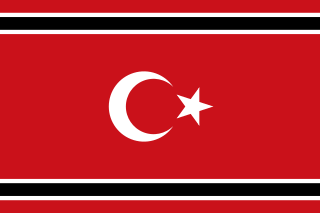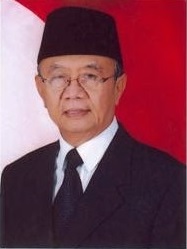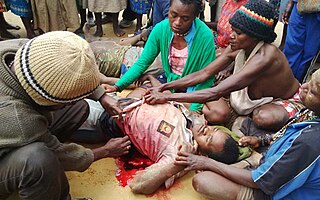Related Research Articles

The Free Aceh Movement was a separatist group seeking independence for the Aceh region of Sumatra, Indonesia. GAM fought against Indonesian government forces in the Aceh insurgency from 1976 to 2005. Estimates of the death toll total over 15,000 people killed.

Wiranto is an Indonesian politician and retired army general, who is serving as the chairman of the Presidential Advisory Council, since December 2019. Previously, he was the Commander of the Indonesian Armed Forces from February 1998 to October 1999 during Indonesia's transition from authoritarian rule to democracy, he ran unsuccessfully for President of Indonesia in 2004 and for the vice-presidency in 2009. On 27 July 2016, Wiranto was appointed Coordinating Minister for Political, Legal, and Security Affairs, replacing Luhut Binsar Panjaitan.

Munir Said Thalib was an Indonesian activist. Founder of the Kontras human rights organisation and laureate of the 2000 Right Livelihood Award, Munir was assassinated in 2004 while travelling to Utrecht University to pursue a master's degree in international law and human rights. He is one of Indonesia's most famous human rights and anti-corruption activists.

The Kopassus is an Indonesian Army (TNI-AD) special forces group that conducts special operations missions for the Indonesian government, such as direct action, unconventional warfare, sabotage, counter-insurgency, counter-terrorism, intelligence gathering and special reconnaissance (SR). Kopassus was founded by Alexander Evert Kawilarang and Mochammad Idjon Djanbi on 16 April 1952. It gained worldwide attention after several operations such as the Indonesian invasion of East Timor and the release of hostages from Garuda Indonesia Flight 206.
Dortheys Hiyo Eluay was an Indonesian local politician from Irian Jaya turned West Papuan independence activist. Known as the former leader of Papua Presidium Council, he was known as the community leader in West Papua region. He was murdered by members of the Indonesian Army special forces command.

Anton Medan, or Haji Muhammad Ramdhan Effendi, birth name Tan Hok Liang, born in Tebing Tinggi, was an Indonesian former robber and gambling tycoon who converted to Islam and became a preacher in 1992. He later established a mosque, Masjid Jami' Tan Hok Liang, in Pondok Rajeg, Cibinong, Bogor. Prior to his conversion to Islam, he grew up amid the dark politics of Indonesia. It was during Suharto's New Order rule when gangsters were used in politics, business and government agencies.
Human rights in Indonesia are defined by the 1945 Constitution and the laws under it; several rights are guaranteed especially as a result of the constitutional amendments following the Reform era. The Ministry of Law and Human Rights deals with human rights issues in the cabinet, and the National Commission on Human Rights, established in Suharto's New Order administration in 1993, is the country's national human rights institution.

Umar Patek is an Indonesian convicted terrorist and member of Jemaah Islamiyah who was wanted in the United States, Australia, and Indonesia on terrorism charges. There was a US$1 million reward offered by the Rewards For Justice Program for information leading to his capture.
Kemusuk is a hamlet (dukuh) in the Argomulyo village, Sedayu subdistrict, Bantul Regency, Special Region of Yogyakarta, Indonesia. The area, around 10 km to the west of Yogyakarta towards the town of Wates, is known as the birthplace of the second president of Indonesia, Suharto.

Yogyakarta International Airport is an international airport located at Temon district of Kulon Progo Regency, in Java, Indonesia. The airport is situated around 45 km (28 mi) from the city of Yogyakarta, which serves the Yogyakarta Special Region, as well as nearby Central Javan cities such as Purworejo, Kebumen, Cilacap and Magelang. It is the largest and one of the three airports in the Yogyakarta Special Region, the other being Adisutjipto Airport which is located closer to the Yogyakarta city center and Gading Airfield in Wonosari, Gunung Kidul Regency. The airport serves flights to and from several cities and towns in Indonesia and some international destinations such as Malaysia and Singapore.

Garuda Indonesian Airways Flight 206 was a Garuda Indonesia flight that was hijacked on 28 March 1981, by the Komando Jihad in Indonesia. The McDonnell Douglas DC-9 plane PK-GNJ was hijacked on a domestic flight and forced to land at Don Mueang International Airport in Bangkok, Thailand. The hijackers demanded the release of their confederates from Indonesian jails and issued other demands. Three days later, the aircraft was stormed by Indonesian special forces. In the ensuing operation, all five hijackers were killed, while the pilot and one Kopassus operative were fatally wounded. All passengers were rescued.

Baharuddin Lopa was an Indonesian Minister of Justice and Human Rights and later Attorney General of Indonesia. He was the student of Dr. Ernst Utrecht.
The Tanjung Priok massacre was an incident that occurred on 12 September 1984, in the port area of Tanjung Priok, Jakarta, Indonesia. Government reports give a total of 24 killed and 54 injured, while survivors report over 100 killed.
Maria Ulfah Soebadio Sastrosatomo, better known by her first married name Maria Ulfah Santoso, was an Indonesian politician and women's rights activist who served as Minister of Social Affairs under Prime Minister Sutan Sjahrir. She was the first Indonesian woman to receive a degree in law as well as the first female Indonesian cabinet member. Santoso, the daughter of a politician, became interested in women's rights after seeing numerous injustices in her youth. Despite pressure to become a doctor, she graduated with a degree in law from Leiden University in 1933; while in the Netherlands she also became involved in the Indonesian nationalist movement.

The 1997–1998 activists kidnappings were abductions of pro-democracy activists which happened between the 1997 Indonesian Legislative Election and the fall of Suharto in 1998. The kidnappings took place in three different phases: before the May 1997 Indonesian legislative elections, two months before the People's Consultative Assembly (MPR) session in March 1998 and in the period just before Soeharto's 21 May resignation. None of those abducted during the first and third period have reappeared. Some of the activists who were abducted in the second period have openly spoken about their experiences.

Major General (Ret.) Muchdi Purwopranjono is an Indonesian politician and former major general who served briefly as chief of the Indonesian Army's Special Forces (Kopassus) and was former deputy head of the State Intelligence Agency (BIN). He was relieved of command duties in 1998 after the fall of Soeharto and was subsequently deemed responsible for abductions of pro-democracy activists. In 2008, he was acquitted of commissioning and assisting in the 2004 assassination of human rights campaigner Munir, following a trial deemed flawed by human rights organizations. He is presently the leader of a breakaway faction of Tommy Soeharto’s Berkarya Party and his leadership is recognized by the government.

Salahuddin Wahid, colloquially known as Gus Solah, was an Indonesian Islamic scholar and politician. He originated from a Nahdlatul Ulama family, and was the younger brother of Indonesian president Abdurrahman Wahid. He served in the country's People's Consultative Assembly (1998–1999), and as the vice chair of the National Commission on Human Rights (2002–2004). During the 2004 Indonesian presidential election, he became the running mate to Wiranto, though the ticket lost the election.
The 2003 Wamena incident involved a sweeping operation and forced relocation of civilians around the town of Wamena by the Indonesian Army and the Indonesian National Police following a raid on an armory. The operations lasted for around two months following the raid, displacing thousands of civilians and resulting in the deaths of around fifty civilians from various causes.
The Semanggi shootings in Jakarta, Indonesia, were two incidents when state troops opened fire on unarmed civilians and protesters during special sessions of parliament. The first incident, known as Semanggi I, took place on 13 November 1998 and 17 people were killed. The second incident, Semanggi II, took place on 24 September 1999 and 12 people were killed and more than 200 wounded.

The Bloody Paniai case, or the Enarotali Massacre was a mass shooting by the Indonesian army from 753rd Special Raider Infantry Battalion of Korem 173/Praja Vira Braja of Kodam XVII/Cendrawasih which killed five teenagers and wounded of 17 others in Enarotali, Paniai Regency, Central Papua, Indonesia on 8 December 2014.
References
- 1 2 3 4 George Roberts (13 April 2013). "Indonesia denies prison raid a violation of rights". ABC News. Archived from the original on 16 April 2013. Retrieved 17 April 2013.
- 1 2 3 Bambang Muryanto (23 March 2013). "Chief warden not ok with detainees' transfer". The Jakarta Post. Archived from the original on 27 April 2013. Retrieved 17 April 2013.
- 1 2 3 4 Bambang Muryanto (24 March 2013). "Armed men ransack prison, kill 4 detainees". The Jakarta Post. Archived from the original on 26 April 2013. Retrieved 17 April 2013.
- 1 2 "One slain detainee identified as cop". The Jakarta Post. 23 March 2013. Archived from the original on 13 April 2013. Retrieved 17 April 2013.
- ↑ "Special forces admit to prison-raid killing". ABC News. 5 April 2013. Archived from the original on 7 April 2013. Retrieved 17 April 2013.
- ↑ Ina Parlina and Margareth S. Aritonang (13 April 2013). "Minister rebuked for jumping gun on Cebongan". The Jakarta Post. Archived from the original on 14 April 2013. Retrieved 17 April 2013.
- ↑ Indra Budiari (12 April 2013). "Open Military Court for Cebongan Prison Raid Actors". The Indonesia Today. Archived from the original on 17 April 2013. Retrieved 17 April 2013.